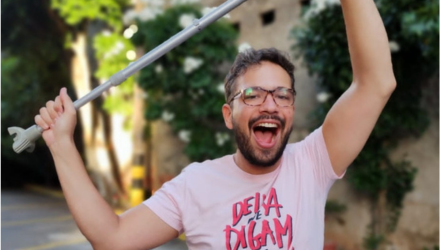Name: Xande Fateicha
Age: 29 years
Where do you call home? In Salvador. Capital of Bahia.
What is your education [degree(s)]? What is a current goal you have with your education/career? I’m a journalist. I graduated the same year I was diagnosed, this was something that made me very insecure about looking for a job. I still looked, unfortunately many doors closed, but now I’m living a very positive phase in my life, with many jobs emerging, within my specific area, which is cultural journalism.
Who do you live with? Single (I love being single), I have no children and I live with my parents.
What’s a typical day for you? My routine is very calm. I wake up, there are days when I go swimming, every day I go to the gym and I do some freelance work from home. Unfortunately, I don’t have an income that allows me to live by myself yet.
How long have you known you are living with FA? When and how were you diagnosed? I received my diagnosis in 2020, until then I didn’t really know anything. I felt insecure when running, but nothing too scary.
Are there any others with FA in your family? No
Describe an adaptation and/or transition you have had to take due to living with FA. Today I use a cane as support to get around (since 2022). My transition from standing up by myself to using a cane was very light, I’m very realistic. I wanted to make an effort with my body, so I could use as much of my balance that I still had and I have this thought until today. That’s why I avoid using a walker 24 hours a day, only if necessary I use a walker, a chair or a bed, no problem at all. But I don’t want to stop before the time comes where I need them and use these tools unnecessarily.
What do you like to do to stay active and what type of exercises work for you to stay strong? I do weight training (gym) 6 times a week and swim twice a week, with the aim of moving and doing things that I wouldn’t do if I were at home. I have a strategy of loose movements to train balance and movements with equipment to work on strength.
Do you have any hobbies or special interests? I love going to the theater, the cinema, the museum alone — enjoying my company and feeling the art, it feeds my soul.
What is a good trick to make daily life easier? To live in the present moment. The past is gone and the future is always indecipherable, we can only live today.
When FA gets you down, what do you think/do to feel better? When I physically fall, I always laugh and thank those who protect and guide me, for being able to get up. When I notice the progress of the disease, I always retract myself a little and then remember that I am living and I have more to live. I am here for that!
What is one way living with FA has POSITIVELY affected your life? It’s a scary diagnosis and I’m not going to say that is a bed of roses because it’s not, but this awakening to life, to enjoying moments, arrived with FA and that’s something very positive.
What is a favorite motivational quote of yours? Don’t die without living.
What is a piece of advice that someone with FA has given you that encourages and inspires you? A friend once told me that she prioritized autonomy and that’s why she went to a wheelchair and this autonomy is something that inspires me and, if necessary, I will be autonomous.
What is the best advice YOU could give to a person who has been newly diagnosed with FA? Don’t wait for tomorrow to do anything, don’t watch life go by, be the protagonist of your story.
What is the first thing you want to do when a cure/treatment for FA is found? Go roller skating on the waterfront of Salvador.
“I have FA, but FA doesn’t have me.” What does this statement mean to you? Neither do I have it nor does she have me, I received the diagnosis and I carry this diagnosis by my side, like my best friend.
Interview by
Natache Iamaya Gomes
